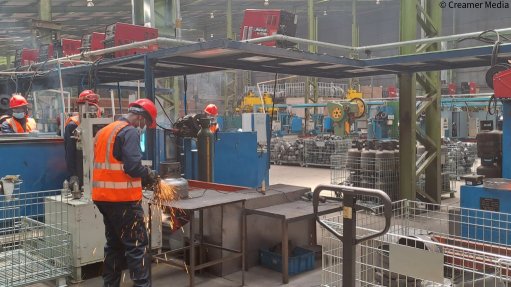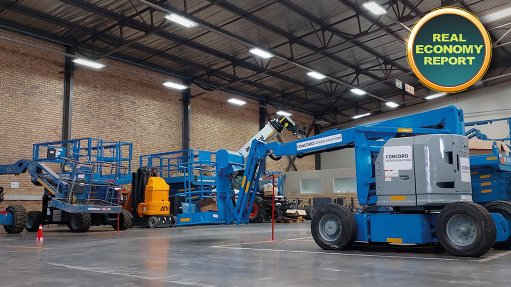The autonomous security revolution: Why South African businesses are taking to the skies
This article has been supplied and will be available for a limited time only on this website.
By: Ruan Botha - DJI Project Manager at Rectron
For decades, security operations have relied on a familiar combination of fixed cameras, perimeter fencing and human patrol teams. While these remain important, they have inherent limitations. Static cameras create predictable blind spots. Human patrols are resource-intensive, slow to cover large areas and vulnerable in high-risk situations. And once installed, infrastructure is both expensive and inflexible.
South Africa's complex security environment, characterised by vast commercial properties, stretched security budgets and sophisticated threats, demands more agile solutions. With over 16 500 registered private security companies employing more than 600 000 personnel, the industry is among the largest in the world yet faces growing pressure to deliver greater effectiveness with fewer resources. Drone technology is closing these gaps, providing on-demand elevated monitoring, rapid incident observation and enhanced situational awareness, all while delivering cost reductions of up to 60% compared to traditional deployments.
Drone applications span industries. Mining operations monitor remote sites and track unauthorised access across kilometres of perimeter. Retail chains coordinate security across multiple locations from centralised control rooms. Residential estates enhance perimeter protection without the expense of additional guard towers or extensive camera networks. Logistics facilities secure high-value inventory across expansive warehouses and yards. The common thread is efficiency: drones reduce the need for large patrol teams and costly fixed infrastructure while improving response capabilities.
Building the support ecosystem
Access to cutting-edge technology means little without the ecosystem to support it. This is where distributors play a critical role in South Africa's security evolution.
At Rectron, our work extends far beyond simply supplying DJI drones to the market. We enable businesses to adopt smarter, more agile security systems through comprehensive training programmes, technical support and integration guidance.
Many organisations want to embrace drone-based security but lack the internal expertise to deploy it effectively. They need partners who understand both the technology and the practical realities of South African operations from regulatory compliance to integration with existing control-room infrastructure. Our role is to bridge that gap, ensuring businesses can confidently implement drone solutions that deliver measurable security improvements.
We equip security teams with training in flight operations, help organisations develop standard operating procedures, and provide ongoing technical support as systems scale. Our goal is to make enterprise-grade drone technology accessible not only to large corporations but also to mid-sized businesses seeking a competitive advantage in security capability.
The distributor’s role in democratising technology
Access to cutting-edge technology means little without the ecosystem to support it. This is where distributors play a critical role in South Africa's security evolution. Beyond distribution and technical enablement, a key element of what we do is ensuring that any drone solution brought into South Africa is fully compliant with local regulations. That includes working closely with the SACAA (South African Civil Aviation Authority) and ICASA to make sure every DJI Enterprise product we import carries the correct system safety approvals, type certificates and radio frequency authorisations before it reaches the end user. These approvals are required before a craft can be registered with the SACAA.
Our role is to ensure that businesses can confidently implement drone solutions that deliver measurable security improvements.
The path to autonomous security systems
The current state of drone security is impressive, but it represents only the beginning. The global safety and security drone market is projected to grow from USD 2.6 billion in 2025 to USD 8.2 billion by 2032, an 18.1% compound annual growth rate driven by technological advancement and proven operational value.
This trajectory points towards increasingly autonomous systems where drones operate with minimal human intervention. AI-powered platforms will conduct automated patrol routes, identify anomalies through machine-learning algorithms and integrate seamlessly with analytics dashboards to provide predictive security insights.
Thermal imaging is already enabling after-hours monitoring that detects human presence regardless of lighting conditions. In the near future, systems will combine multiple sensor types, visual, thermal, LiDAR, to create comprehensive threat-assessment models. Drones will complement existing security infrastructure, working alongside control rooms, access systems and response teams rather than replacing them.
Integration possibilities extend to crowd monitoring at events, automated perimeter sweeps at scheduled intervals and rapid deployment during emergencies where human access is dangerous or delayed. These are not speculative capabilities; the technology exists today. The challenge now lies in deploying it at scale.
Navigating Implementation Challenges
Realising this vision requires addressing practical challenges. Skills development remains paramount. Security teams need training not just in-flight operations but also in data interpretation and system management.
Integration with legacy systems demands careful planning and, often, tailored solutions. Regulatory compliance, particularly around airspace management and operational permissions, requires expertise and attention.
Privacy considerations must also be balanced with security needs, ensuring responsible deployment that respects individual rights while protecting people and property. Organisations must decide whether to build internal drone capabilities or partner with specialised service providers, a choice influenced by scale, budget and strategic priorities.
Autonomous security systems are not a distant concept; they are operational today and advancing rapidly. Organisations that embrace drone technology position themselves ahead of evolving security threats, gaining capabilities that were once unattainable or prohibitively expensive.
The security landscape is being reshaped by technology that delivers better coverage, faster response and enhanced intelligence at lower operational costs. As South Africa's leading distributor of DJI drone technology, Rectron is committed to supporting businesses through this transition, providing not just equipment but the expertise and partnership required to deploy these systems effectively.
The question is no longer whether drones will transform security operations, but how quickly organisations will adapt to leverage their capabilities. The future of security is autonomous, intelligent and airborne, and it’s already here.
Article Enquiry
Email Article
Save Article
To advertise email advertising@creamermedia.co.za or click here
Comments
Press Office
Announcements
What's On
Subscribe to improve your user experience...
Option 1 (equivalent of R125 a month):
Receive a weekly copy of Creamer Media's Engineering News & Mining Weekly magazine
(print copy for those in South Africa and e-magazine for those outside of South Africa)
Receive daily email newsletters
Access to full search results
Access archive of magazine back copies
Access to Projects in Progress
Access to ONE Research Report of your choice in PDF format
Option 2 (equivalent of R375 a month):
All benefits from Option 1
PLUS
Access to Creamer Media's Research Channel Africa for ALL Research Reports, in PDF format, on various industrial and mining sectors
including Electricity; Water; Energy Transition; Hydrogen; Roads, Rail and Ports; Coal; Gold; Platinum; Battery Metals; etc.
Already a subscriber?
Forgotten your password?
Receive weekly copy of Creamer Media's Engineering News & Mining Weekly magazine (print copy for those in South Africa and e-magazine for those outside of South Africa)
➕
Recieve daily email newsletters
➕
Access to full search results
➕
Access archive of magazine back copies
➕
Access to Projects in Progress
➕
Access to ONE Research Report of your choice in PDF format
RESEARCH CHANNEL AFRICA
R4500 (equivalent of R375 a month)
SUBSCRIBEAll benefits from Option 1
➕
Access to Creamer Media's Research Channel Africa for ALL Research Reports on various industrial and mining sectors, in PDF format, including on:
Electricity
➕
Water
➕
Energy Transition
➕
Hydrogen
➕
Roads, Rail and Ports
➕
Coal
➕
Gold
➕
Platinum
➕
Battery Metals
➕
etc.
Receive all benefits from Option 1 or Option 2 delivered to numerous people at your company
➕
Multiple User names and Passwords for simultaneous log-ins
➕
Intranet integration access to all in your organisation





















